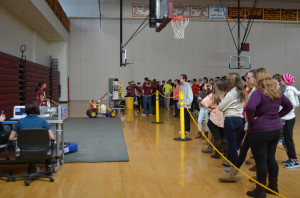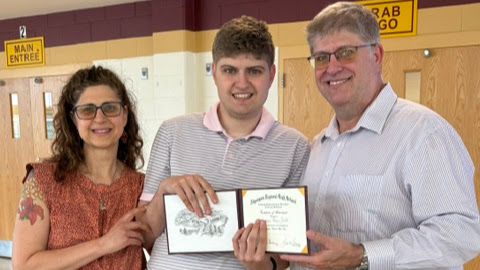Science clubs experiment with new extravaganza

Various science clubs showed off their collective talents at the Science Day festivities on Nov. 8, letting clubs that do not usually perform in front of large audiences showcase their skills.
Some people may be under the impression that sports teams are the only ARHS teams that compete. Students pack the football stadium every Friday during the fall and the basketball gym on winter nights, but rarely do students go see what the robotics team is all about. For one day at the science fair, the kids on those teams got to showcase their talents.
“The goal of the science day was to get kids to see what these clubs do, to recognize them, and to maybe get kids to want to join their club… This is a special group. This is a group of kids that are really bright, and this type of event can showcase their talents,” said science department chair Lorraine Zanini, who served as the coordinator of the science fair.
The clubs present at the fair were the robotics team, the environmental club, the programming club, the Science Olympiad, and the Math Team. All club members who participated put their best science forward, and all had a great time doing so.
“We’re here to encourage kids to participate in extracurricular academic activities. I want to share my passion for science,” said senior Olivia Murphy, a member of the Science Olympiad.
Other than having fun and showing off their talents, a goal of the club members was to teach Algonquin about STEM: Science, Technology, Engineering, and Math.
“We’re doing this fair to promote STEM focused activities to show we’re not just a sports based school,” said junior Dan Hogan, a member of the robotics team.
Many club members and faculty believe that learning STEM is crucial to a good education and is critical to modernizing the school and having it be successful in the future.
“The most important lesson from STEM is that of critical thinking and problem solving skills. In science, technology, engineering, and math, there are often correct answers: they’re less open to interpretation than art, music, and literature. It really gives an opportunity to solve problems, both abstract and also very hands on and concrete,” said physics teacher Nathan Largesse, the faculty advisor of the Science Olympiad.
“We need to show we can make changes with technology and science that can change the world. We’re the next generation of scientists and engineers and our goal is to help,” said junior Sven Patterson, a member of the robotics team.
A donation of $40 or more includes a subscription to the 2025-26 print issues of The Harbinger. We will mail a copy of our fall, winter, spring and graduation issues to the recipient of your choice. Your donation supports the student journalists of Algonquin Regional High School and allows our extracurricular publication to purchase equipment and cover our annual website hosting costs.
Dan Fishbein joined the Harbinger in 2011 as a staff writer, and became the Sports Editor later that same year. In 2012, Dan became the Harbinger's News...












